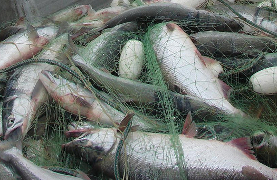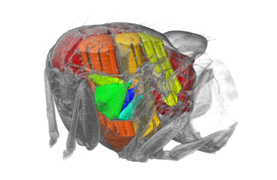This week in PLOS Biology
In PLOS Biology this week you can read about saving the world’s fish stocks, the intricacies of insect flight, non-human drumming, a new player in colon cancer, bringing species back from extinction, and a new role in cognition for an old protein.

Would closing international waters to fishing be a win-win approach to conservation? In a Perspective this week, Crow White and Christopher Costello suggest just that. 58% of the ocean is a high seas commons: that is, fishing is open to all. Over-exploitation in the race to fish this part of the ocean has dramatically reduced fish stocks. Using a spatial bioeconomic model, Crow & Costello conclude that closing the high seas to all fishing would not only lead to global increases in fish stocks, but would also increase harvest and profit.

The ability for powered flight has evolved four times over in the animal kingdom. The flight abilities of flies in particular are astonishing, as anyone who has ever tried to swat one can testify. In new research, Simon Walker, Graham Taylor and colleagues have used high-speed X-ray imaging to make exquisite 3D movies of the insides of live flying insects. Insights into how exactly a fly powers and controls flight have previously been hindered by the huge complexity of the muscle movements involved. This new approach allowed the authors to visualise the dynamic steering process and has potential for novel designs of micro air vehicles. See also the accompanying synopsis, and Emma Ganley’s PLOS Biologue blog post.
This week we feature one of our ‘Unsolved Mystery’ series. Aniruddh Patel addresses Darwin’s speculation in The Descent of Man that the capacity for musical rhythm is widespread across animal species. Great apes are known to drum in the wild, and being so closely related to humans it seems likely that they would be able to keep a rhythm if Darwin’s theory was right. However new research suggests that chimps are unable to spontaneously synchronise tapping to a metronome at different tempos, and that our talent for rhythm is more unique than we’d thought.
JMJD6 is a protein which is present at high levels in various types of human cancer – including aggressive colon cancers. Yongfeng Shang and colleagues investigated the potential for JMJD6 as a biomarker for colon cancer aggressiveness. They found that one of its effects is to add a hydroxyl group to a specific lysine residue of the tumour-suppressing protein p53. This post-translational modification reduces the activity of p53 and promotes colon cancer.

A Perspective by Carrie Friese and Claire Marris discusses the debate around the use of cloning to bring back extinct species (or ‘de-extinction’). They argue that de-extinction could incorporate concerns from various parties, focusing less on spectacular science and more on daily practices.
The underlying molecular mechanisms of transduction of signals for memory and behaviour remain largely unknown. In new research this week, Rajesh Jayachandran, Jean Pieters and colleagues find that the evolutionarily conserved protein coronin 1 is needed for activating the cyclic AMP signaling pathway in the brain and is important for cognition and behaviour. Coronin 1 is a member of a highly conserved family of proteins, and although its gene lies in a chromosome region associated with neurobehavioral dysfunction in mice and man, it has never been directly ascribed a specific function in the brain.
